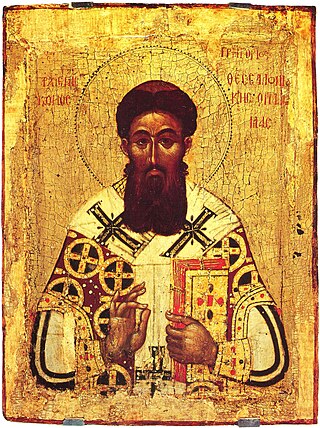In the Platonic, Neopythagorean, Middle Platonic, and Neoplatonic schools of philosophy, the demiurge is an artisan-like figure responsible for fashioning and maintaining the physical universe. The Gnostics adopted the term demiurge. Although a fashioner, the demiurge is not necessarily the same as the creator figure in the monotheistic sense, because the demiurge itself and the material from which the demiurge fashions the universe are both considered consequences of something else. Depending on the system, they may be considered either uncreated and eternal or the product of some other entity.

Gnosticism is a collection of religious ideas and systems that coalesced in the late 1st century AD among Jewish and early Christian sects. These various groups emphasized personal spiritual knowledge (gnosis) above the proto-orthodox teachings, traditions, and authority of religious institutions.

Apophatic theology, also known as negative theology, is a form of theological thinking and religious practice which attempts to approach God, the Divine, by negation, to speak only in terms of what may not be said about the perfect goodness that is God. It forms a pair together with cataphatic theology, which approaches God or the Divine by affirmations or positive statements about what God is.

The Nag Hammadi library is a collection of early Christian and Gnostic texts discovered near the Upper Egyptian town of Nag Hammadi in 1945.

The Books of Jeu are two Gnostic texts. Though independent works, both the First Book of Jeu and the Second Book of Jeu appear, in Sahidic Coptic, in the Bruce Codex. They are a combination of a gospel and an esoteric revelation; the work professes to record conversations Jesus had with both the male apostles and his female disciples, and the secret knowledge (gnosis) revealed in these conversations.
The Sethians were one of the main currents of Gnosticism during the 2nd and 3rd century AD, along with Valentinianism and Basilideanism. According to John D. Turner, it originated in the 2nd century AD as a fusion of two distinct Hellenistic Judaic philosophies and was influenced by Christianity and Middle Platonism. However, the exact origin of Sethianism is not properly understood.
The Thought of Norea is a Sethian Gnostic text. It is the second of three treatises in Codex IX of the Nag Hammadi library texts, taking up pages 27–29 of the codex's 74 pages. The text consists of only 52 lines, making it one of the shortest treatises in the entire library. The work is untitled; editor Birger A. Pearson created the title from the phrase "the thought of Norea" that appears in the final sentence of the text. The text expands Norea's plea for deliverance from the archons in Hypostasis of the Archons. It is divided into four parts: an invocation, Norea's cry and deliverance, her activity in the Pleroma, and salvation.
Allogenes is a series of Gnostic texts. The main character in these texts is Allogenes, which translates as 'stranger,' 'foreigner,' or 'of another race.' The first text discovered was Allogenes as the third tractate in Codex XI of the Nag Hammadi library. The Coptic manuscript is a translation of a Greek original, likely written in Alexandria before 300 AD. In this text, containing Middle Platonic or Neoplatonic elements, Allogenes receives divine revelations.

Platonism is the philosophy of Plato and philosophical systems closely derived from it, though contemporary Platonists do not necessarily accept all doctrines of Plato. Platonism has had a profound effect on Western thought. At the most fundamental level, Platonism affirms the existence of abstract objects, which are asserted to exist in a third realm distinct from both the sensible external world and from the internal world of consciousness, and is the opposite of nominalism. This can apply to properties, types, propositions, meanings, numbers, sets, truth values, and so on. Philosophers who affirm the existence of abstract objects are sometimes called Platonists; those who deny their existence are sometimes called nominalists. The terms "Platonism" and "nominalism" also have established senses in the history of philosophy. They denote positions that have little to do with the modern notion of an abstract object.
Gnosticism refers to a collection of religious groups originating in Jewish religiosity in Alexandria in the first few centuries AD. Neoplatonism is a school of Hellenistic philosophy that took shape in the 3rd century, based on the teachings of Plato and some of his early followers. While Gnosticism was influenced by Middle Platonism, neoplatonists from the third century onward rejected Gnosticism. Nevertheless, Alexander J. Mazur argues that many neoplatonic concepts and ideas are ultimately derived from Sethian Gnosticism during the third century in Lower Egypt, and that Plotinus himself may have been a Gnostic before nominally distancing himself from the movement.
John D. Turner was the Cotner Professor of Religious Studies and Charles J. Mach University Professor of Classics and History Classics & Religious Studies at the University of Nebraska. He was well known for his translations of the Nag Hammadi library.
The Manichaean Psalm Book or Manichaean Psalter is a Manichaean text written in Coptic. It is believed to have been compiled in the late 3rd century or the mid-4th century. Excavated in 1929 as part of the Medinet Madi library, the Psalm Book is believed to contain remnants of some of the earliest extant Manichaean literature.
The Hypostasis of the Archons, also called The Reality of the Rulers or The Nature of the Rulers, is a Gnostic writing. The only known surviving manuscript is in Coptic as the fourth tractate in Codex II of the Nag Hammadi library. It has some similarities with On the Origin of the World, which immediately follows it in the codex. The Coptic version is a translation of a Greek original, possibly written in Egypt in the third century AD. The text begins as an exegesis on Genesis 1–6 and concludes as a discourse explaining the nature of the world's evil authorities. It applies Christian Gnostic beliefs to the Jewish origin story, and translator Bentley Layton believes the intent is anti-Jewish.
Henosis is the classical Greek word for mystical "oneness", "union" or "unity". In Neoplatonism, henosis is unification with what is fundamental in reality: the One, the Source, or Monad. The Neoplatonic concept has precedents in the Greek mystery religions as well as parallels in Eastern philosophy. It is further developed in the Corpus Hermeticum, in Christian theology, Islamic Mysticism, soteriology and mysticism, and is an important factor in the historical development of monotheism during Late Antiquity.
Birger A. Pearson is an American scholar and professor studying early Christianity and Gnosticism. He currently holds the positions of Professor Emeritus of Religious Studies at the University of California, Santa Barbara and Professor and Interim Director of the Religious Studies Program at the University of California, Berkeley.
Neoplatonism was a major influence on Christian theology throughout Late Antiquity and the Middle Ages in the East, and sometimes in the West as well. In the East, major Greek Fathers like Basil, Gregory of Nyssa and Gregory of Nazianzus were influenced by Platonism and Neoplatonism, but also Stoicism often leading towards asceticism and harsh treatment of the body, for example stylite asceticism. In the West, St. Augustine of Hippo was influenced by the early Neoplatonists Plotinus and Porphyry. Later on, in the East, the works of the Christian writer Pseudo-Dionysius the Areopagite, who was influenced by later Neoplatonists such as Proclus and Damascius, became a critical work on which Greek church fathers based their theology, like Maximus believing it was an original work of Dionysius the Areopagite.
April D. DeConick is the Isla Carroll and Percy E. Turner Professor of New Testament and Early Christianity at Rice University in Houston, Texas. She came to Rice University as a full professor in 2006, after receiving tenure at Illinois Wesleyan University in 2004. DeConick is the author of several books in the field of Early Christian Studies and is best known for her work on the Gospel of Thomas and ancient Gnosticism.
Neoplatonism is a version of Platonic philosophy that emerged in the 3rd century AD against the background of Hellenistic philosophy and religion. The term does not encapsulate a set of ideas as much as a series of thinkers. Among the common ideas it maintains is monism, the doctrine that all of reality can be derived from a single principle, "the One".

Madeleine Scopello is a French historian of religion. She is director of research at the CNRS and director of studies at the École pratique des hautes études. She also teaches at the Institut catholique de Paris, Faculty of History.
In Sethian Gnosticism, Autogenes is an emanation or son of Barbelo. Autogenes is mentioned in Nag Hammadi texts such as Zostrianos, The Three Steles of Seth, Allogenes the Stranger, and Marsanes.






